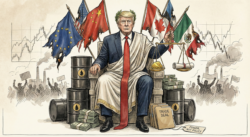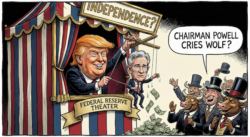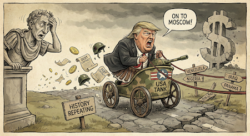- Atlas didn’t just shrug
- Which Atlas Shrugged character are you?
- How to invest in an Atlas Shrugged world
Is our political news sounding strangely familiar? Then you must’ve been reading Atlas Shrugged recently.
Ayn Rand’s novel goes into the power dynamics created when governments play an interventionist role in our lives. As they do today.
This passage is especially poignant in a country run by the likes of Ed Miliband and Rachel Reeves …
‘When you see that in order to produce, you need to obtain permission from men who produce nothing — When you see that money is flowing to those who deal, not in goods, but in favors — When you see that men get richer by graft and by pull than by work, and your laws don’t protect you against them, but protect them against you — When you see corruption being rewarded and honesty becoming a self-sacrifice — You may know that your society is doomed.’
That doom has been spreading fast.
The steel industry that the novel focuses on is a long-lost victim.
Our railroads are a joke.
The once-mighty British energy sector of our economy is the current target of government policy.
Tax policies mean the finance sector is next to fall.
Infrastructure can’t get built because those who build nothing can prevent it.
Investors are prevented from buying cryptocurrencies by those who don’t understand them. I wonder how much money investors lost by being blocked from buying bitcoin…
Those providing housing for renters are punished for it. Those creating jobs have to pay payroll taxes for the privilege. Those who try to fix things politically get debanked for their trouble.
Those tasked with defending the country’s flag are arresting people for flying it.
And the government that’s supposed to protect our free speech is attacking the corporations that provide it.
This is exactly the sort of societal and economic breakdown that Atlas Shrugged is all about.
But if you’ve read the book, here’s what I want you to focus on…
It tells you how to invest
The five heroes of the book are all entrepreneurs and investors…of a sort.
They deal with the challenge of an interventionist government in very different ways. I think you can see them as five different models of investing for your own life.
One character goes off the grid to set up his own little world, where governments don’t bother him. That’s where the catch phrase “Who is John Galt?” comes from. It should really be “Where is John Galt,” but it’s a bit late for that edit.
The John Galt trend is playing out today in the form of the brain drain and non-dom exodus to other countries. The London Stock Exchange is amidst a drought of listings too. As the joke goes, Spain has an Artificial Intelligence regulatory agency, but no AI companies for it to regulate…
A second Atlas Shrugged character becomes a pirate as an act of revolt. He loots the corrupt government system and the wealth it confiscates.
There aren’t many Robin Hood types around today though. And I don’t recommend becoming one, or investing in them.
The third hero is a fraudster. He uses the dodgy nature of the political system against itself to profit in ways that expose how corrupt the system is.
The character reminds me of Elon Musk and his EVs. Except the cars are very real, unlike the investment scheme of the Atlas Shrugged character.
Still, it’s absurd that someone can become the richest person on the planet thanks to government subsidies of his cars. Especially given the environmental damage done by the materials needed to build them.
The fourth and fifth characters in the book try to succeed spectacularly despite the government’s best efforts to thwart them.
Many entrepreneurs feel that way today. They plough through endless unnecessary government paperwork just to be allowed to run their business at all.
Missing from the list of characters is the real hero of a world where governments control every aspect of life: the black-market operator.
If you think they don’t feature today, take a walk around Westminster. You’ll see piles of black-market cigarette packets blowing in the wind.
Given we face an Atlas Shrugged sort of world, I think we can position investments using this classification system. Not to mention investors.
What sort of investor are you?
Let’s use the types of Atlas Shrugged characters to think about investments you can make…
Gold is an opt out from the government’s misbehaviour. Inflation, deflation, regulation or whatever else they come up with, gold is the best way to protect your wealth from it.
It is an investor’s Galt’s Gulch – the place where John Galt goes to hide from government interference.
Cryptocurrencies and technology investments are actively anti-government. They upend the established order and evade the political system. That’s why governments initially feared them so.
Have you noticed the popularity of the climate change movement amongst the sorts of billionaires who made their fortunes polluting the environment in the first place?
These days, they’re agitating for more green energy while investing in the metals it needs. That’s a classic sign of using the system against itself to make money in a cynical way.
Political movements are mighty profitable for insiders, as the Black Lives Matter Movement showed. The secret, then, is to be an insider by pretending to buy into the cause.
If your product sucks, just make it politically important. It doesn’t matter how expensive EVs are if the government’s subsidies reduce their real cost to make them sell. They could fail in cold weather or spontaneously combust for all their producers care — as long as the government helps sell them, or even makes them compulsory, as some have legislated.
Some companies toil away to try and become successful despite all the government intervention in their markets. It makes things a lot more difficult, but not impossible. Tobacco stocks have performed remarkably well.
If the world resembles Atlas Shrugged, use the book to your advantage
If you want to become an investor who can succeed in an Atlas Shrugged world, why not imitate those who succeeded in the fictional version?
First, try applying this prism to your own portfolio to see how your investments fit into the classifications.
Which ones are evading the government, which are fighting its grip, which are trying to succeed despite the government’s efforts and which are playing the system for all it is worth?
Fossil fuel companies are succeeding despite government promises to phase out their products.
Cryptocurrencies are surging as governments lose control of their balance sheets.
Nuclear power stocks are surging in anticipation of government contracts.
The US government is investing in resources, defence and tech companies.
The list goes on. But the theme is the same. How to profit from a world where governments have their thumb on every scale.
Understanding Atlas Shrugged will provide you with an investment edge by making you ask, think about and at least partially answer these sorts of questions. It’s time to reread it.
Or, if you can’t face the thought of that many pages, just click here for the investments that Ayn Rand would’ve made right now.
Until next time,

Nick Hubble
Editor at Large
P.S. In an Atlas Shrugged world, real assets win. That’s why I revealed what I call the AI Master Key—a rare play on the coming boom that isn’t a stock or ETF. It could take off as soon as 17 September. You can still catch the briefing here.



